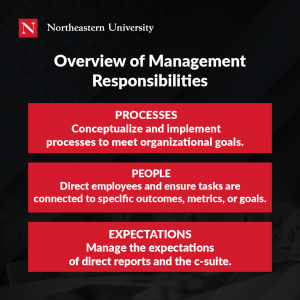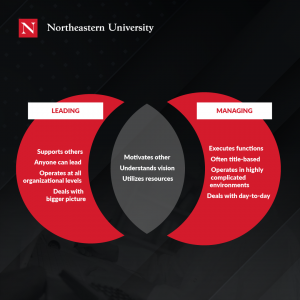There are many reasons you might be interested in improving your management skills.
You may have found yourself thrust into a management role because you’ve proven yourself capable of meeting challenges head-on, despite having no formal management training. Perhaps you don’t currently work in management, but want to improve your skill set to gain the experience you know you need to eventually make the leap. Or, maybe you are an entrepreneur and understand that running your own business will require you to learn how to manage yourself and others more effectively.
Whatever the case, if you’re looking for advice you can leverage to become a better manager, keep reading. Below, we explore the key roles and responsibilities of effective managers and offer advice and tips you can quickly put into action to improve your management skills and reach your career goals.
Learn More about Northeastern’s Bachelor of Science in Management Program
Get the leadership skills you need to advance your organization and your career.
Roles and Responsibilities of a Manager
For most organizations, managers occupy an important spot on the organizational chart, existing between the company’s leadership (CEO, vice presidents, directors, etc.) and rank-and-file employees. As such, managers are responsible for understanding leadership’s strategic initiatives and goals and using that understanding to direct the actions and work of individual employees in a way that aligns with those goals.
Depending on the size and complexity of the business, the organizational chart can be flat (with a single layer of managers between workers and executives), vertical (with middle management forming an intermediate layer in between), or matrixed (with some individuals reporting to more than one supervisor or leader).
While the specific tasks and duties managers are expected to perform vary substantially depending on the organization, business segment, or department they oversee, management responsibilities largely fall into the following categories:
- Managing processes: Managers are broadly responsible for conceptualizing and implementing the processes and workflows that must take place for the organization to meet its goals.
- Managing people: Managers must direct employees as they complete discrete tasks and ensure that these tasks are connected to specific outcomes, metrics, or goals.
- Managing expectations: Managers must manage the expectations of direct reports (what work is to be done) and the c-suite (what realistic outcomes are possible for a particular initiative).

11 Tips for Becoming a Better Manager
Below, we discuss specific advice and tips that you can use to improve your management skills in each of the main areas outlined above.
Managing Processes
Process refers to the specific actions and workflows your personnel and organization undertake to reach their goals. Through effective management of these processes, it’s possible to identify inefficiencies and address them so your staff can work in a more efficient, productive, and profitable way. Incorporating the tips below can help you better manage and leverage processes within your organization:
1. Practice consistency. Following set processes for certain tasks within your organization can yield positive results. Optimized processes allow for repeatability and efficiency, amongst other benefits. But to realize these benefits, you and your staff must be consistent in following these processes. Do your part to ensure everyone on your team understands the processes they should follow. Beyond this, it’s helpful to explain why the processes should be followed and how abiding by them will lead to positive outcomes.
2. Don’t be afraid to make adjustments. One of the biggest mistakes that organizations make is following a process for process’s sake. “We’ve always done it that way” is not a sufficient justification for any business process. While a particular process or workflow may have made sense at one time, that doesn’t mean it will always make sense. Give yourself the flexibility to adjust processes as necessary, and empower your staff to come to you if they feel burdened by overly complicated workflows.
3. Look for opportunities to innovate. Sometimes, one innovation can mean the difference between a profitable company and an industry leader. While product innovation often gets the bulk of the attention in conversation, process innovation can be incredibly valuable to an organization in further developing effective leaders.
Managing People
To be an effective manager, you need to understand how to manage people, including direct reports, team members, outside contractors, or even superiors. Consider the following tips to improve your abilities in managing people:
4. Embrace leadership principles. Although the terms “leadership” and “management” are often used interchangeably, they have very different meanings. The truth is that not all managers are leaders. Developing your leadership skills can help you inspire others to follow your lead.

5. Stay flexible. When you are responsible for overseeing a large number of employees or tasks, you might be tempted to follow a very prescriptive format. While there are benefits to having a set of policies and standard operating procedures, it’s also to maintain enough flexibility to counteract the occasional surprise that is bound to arise from time to time. Similarly, exercise your emotional intelligence by avoiding micromanaging your team any more than you have to, as this can negatively impact morale and productivity.
6. Learn how to motivate your team. A motivated team is an engaged and productive team. By learning how you can keep your team motivated, you can directly impact your progress towards key goals and initiatives.
7. Manage up. It’s understandable to think that management is all about managing down the organizational chart. But it is just as important to realize that you can manage up the organizational chart as well. Doing so will help you build a meaningful relationship with your own manager, allowing you to better align with their goals and expectations.
Managing Expectations
It isn’t uncommon for superiors, especially those who are far removed from the day-to-day activities of a team or department, to come to the table with expectations for a project or initiative that simply are not feasible. When this happens, it’s your job as a manager to educate your bosses on what is possible given the existing circumstances and the desired outcome. This will enable them to either adjust their expectations or give them the opportunity to provide you with additional resources that you can leverage to reach those lofty goals. Consider the following advice to become better skilled at managing the expectations of everyone on your team:
8. Become more data-driven. If you’re tasked with a new initiative, your first step should be to determine the metrics that the project is expected to impact. Once you have identified these key performance indicators (KPIs), you can leverage data to benchmark your current state and determine realistic goals and timeframes. Without this data, it will be difficult to understand what is manageable and what might be an overly aggressive goal.
9. Focus on alignment. A key part of managing your team is to ensure that they understand how their jobs and actions directly align with business goals. Knowing how and why what they do matters to the company as a whole helps to create a sense of shared responsibility, and can improve employee engagement in significant ways. Transparency with your team about goals also helps workers understand that targets are not arbitrarily chosen.
10. Improve your communication skills. Strong communication skills will be essential in your mission to effectively manage the expectations of your stakeholders and team members. Take every opportunity available to improve these skills.
11. Give regular performance updates. It isn’t enough to measure progress towards your goals; you must also communicate this progress to everyone involved. Performance updates allow everyone to understand whether or not you are on track to hit the goals you have outlined. Regularly give performance updates to everyone involved—both stakeholders and those you manage—so that everyone knows how you are progressing towards shared goals. In the event you are not on track to hit your targets, this allows the opportunity to make necessary adjustments to either improve performance or scale back expectations.
What Makes a Successful Manager?
Real, hands-on experience in the workplace is a critical piece of becoming an effective manager, as on-the-job training and time spent in a managerial position will allow you to slowly earn the experience you will need to be a successful manager.
But gaining such experience takes time. Many individuals who join a company in an entry-level position with the goal of becoming a manager can spend years or even decades in their current role before they have learned enough and developed their skills to the point that they can effectively manage others.
If you don’t have years or decades to wait, earning a relevant degree such as a bachelor’s degree in management can help you jumpstart your career and break into a management or leadership position earlier in your career. And for individuals who are already in a management position, earning a degree can reap many additional benefits. In addition to teaching you valuable skills that can help you become a more effective manager, earning a degree can also make it easier to transfer to a new organization or business if you ever decide that you want to make a change, which can be difficult without the appropriate credentials.
Are you considering going back to school to earn a degree and improve your career? To learn more, explore Northeastern’s bachelor’s degree completion programs or get advice from an admissions counselor today.
